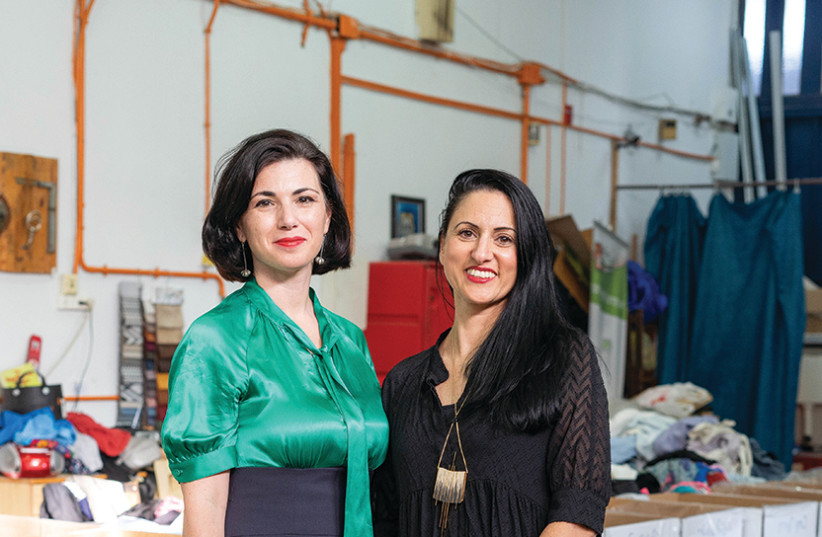The aim of Re-Born Textiles is to provide a circular economy solution for municipalities’ textile waste, which comprises up to 10% of a city’s solid waste.
By VICTORIA MARTYNOV DECEMBER 27, 2020 20:35

The journey of two local fashion professionals paves the way to the innovative circular fashion industry in Israel.Just a few years ago, Israeli fashion designer Revital Nadiv was working for such prestigious companies as Disney and Fila-Gottex, manufacturing new items and promoting her own brands. However, she came to realize that the big breakthrough in fashion lay in the opposite direction. While traveling in Africa, she saw that brand names such as Zara, Mango, and H&M were being sold for very little money in the local markets, and there were huge dumps of discarded clothing brought from the Western countries. Some dumps were the size of stadiums, marking the demise of the textile industry.
Upon returning to Israel, Nadiv started her research. “I was staggered by the numbers,” she says. “Israel produces 500,000 tons of textile waste annually, which amounts to nearly NIS 150 million. It is burned or buried, if not sent overseas. I came up with an ambitious plan. Why not turn that waste into raw material for Israeli smart technologies?”
Nadiv, who always loved technology, started to look for partners. To her surprise, she found that traditional Israeli textile industries were indifferent to innovative projects, even though it could mean no less than survival. One day, she received a call from Viktoria Kanar, a fashion entrepreneur who organizes international fashion events. With a track record that included events such as Tel Aviv Fashion Week, Berlin Fashion Week, Vietnam International Fashion Week, and Eurovision, she set her sights on creating something even more ambitious and global.
In 2019, Nadiv and Kanar opened their first textile center Re-Fresh in Kfar Saba and began seeking funding. Kfar Saba was the only city in the country that agreed to embrace such a project, as the mayor, Rafi Saar, endorses a sustainability approach to urban life. The city also helped to collect 10 tons of discarded clothing.
Recently, the first urban circular management project Re-Born Textiles was launched in Israel. It is supported by the German Embassy, Bank Hapoalim, and H&M, as well as the NGOs Dandasha and Ani Shlishi. The aim of Re-Born Textiles is to provide a circular economy solution for municipalities’ textile waste, which comprises up to 10% of a city’s solid waste. The solution is based on three pillars: 1. Discarded clothes in new/almost new condition are returned to the retailers (re-use). 2. Discarded clothes and textiles are upcycled into new textile products with the help of new technology (re-make) 3. Clothes and textiles are recycled and used in other industries, such as construction and automobiles (re-purpose).
Speaking at the opening ceremony of Re-Born Textiles in Kfar Saba. German Ambassador Susanne Wasum-Rainer said, “We are proud to be a partner of the Re-Born Textiles project. Promoting sustainability and a greener economy to mitigate climate change is one of the core priorities of Germany’s EU Council presidency. In addition, we believe that the current health crisis presents an enormous opportunity to make changes toward more sustainability, which includes improving the waste management of the textile industry. We felt that the Re-Born project, also in regard to its social element, was more than needed, and it is our pleasure to join the initiative’s efforts to make the world a little greener.”
Despite the corona crisis, 100 women from various sectors of Israeli society are participating in a course to learn about circular management, as well as professional textile sorting. While it was suggested that the project will help underprivileged women earn an income, it also drew the attention of people who were looking for new prospects. One of the participants in the course, advocate Romi Liberman, says that for years she has been dreaming about finding a new creative profession, and this project is giving her that opportunity. “Finding interesting fabric that is not being produced anymore and combining it with new materials makes me happy. What is surprising is that circular management can provide a good living.” People who are looking for a new way of life can find it in the new concept of reconstructing and re-purposing fabric.
https://www.jpost.com/opinion/re-born-textiles-turning-garbage-into-gold-653420
